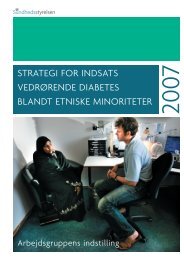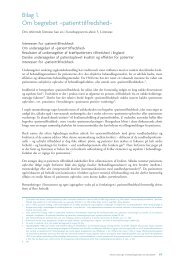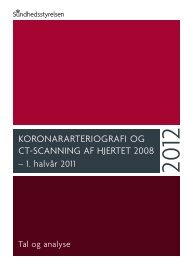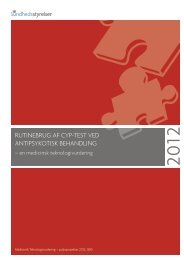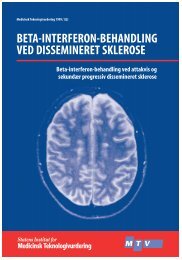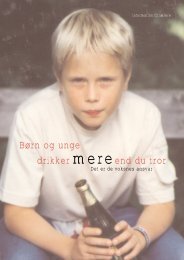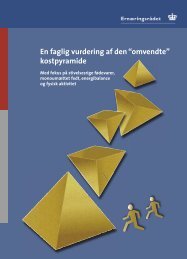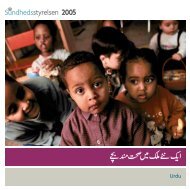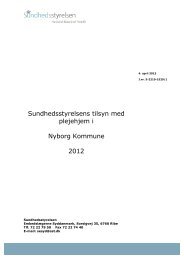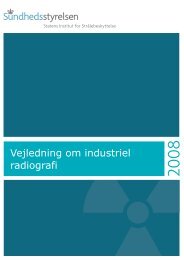LEDDEGIGT – - Sundhedsstyrelsen
LEDDEGIGT – - Sundhedsstyrelsen
LEDDEGIGT – - Sundhedsstyrelsen
You also want an ePaper? Increase the reach of your titles
YUMPU automatically turns print PDFs into web optimized ePapers that Google loves.
Model B: TNF-alpha antagonists to all newly diagnosed patients plus<br />
patients who fail to respond to slowly-acting anti-rheumatic drugs<br />
In this model it is assumed that all newly diagnosed patients are started on<br />
treatment with TNF-alpha antagonists (corresponding to approximately 1,700<br />
patients annually). In addition, the treatment is to be given to the other patients<br />
who are unresponsive to the slowly-acting anti-rheumatic drugs. This group is<br />
expected to correspond to 10-20% of the population of rheumatoid arthritis<br />
patients attended by rheumatologists, and is estimated to total 1,600-3,300 3 patients.<br />
Including newly diagnosed patients a total of 10.100-11.800 4 patients will<br />
be candidates for treatment with TNF-alfa antagonists during a five year period.<br />
Due to the use of TNF-alpha antagonists, this model with infliximab entails a<br />
first-year additional personnel requirement corresponding to approximately 8<br />
full-time positions for physicians, 16 for nurses and 10 for secretaries, increasing<br />
considerably by the fifth year to 29, 57 and 36 full-time positions,<br />
respectively. The personnel resources are calculated assuming optimal organization<br />
of the work burden and the gathering of patients in centralized units.<br />
At the national level the annual additional costs when using infliximab will<br />
increase from DKK 136 million in the first year to DKK 505 million by the<br />
fifth year, of which expenses for medication account for 90%.<br />
With etanercept the personnel requirements are more modest, corresponding<br />
to 4 additional full-time positions for nurses in the first year, increasing to 6<br />
in the fifth year. The associated additional costs amount to DKK 169 million<br />
in the first year, increasing to DKK 942 million by the fifth year.<br />
The above figures do not include additional costs and additional personnel<br />
requirements associated with early referral and diagnosis.<br />
Model C: TNF-alpha antagonists solely to patients who fail to<br />
respond to slowly-acting anti-rheumatic drugs<br />
In this model it is anticipated that due to the positive effects hereof, only<br />
approximately 10% of the patients diagnosed after introduction of early<br />
referral and diagnosis will need to start treatment with TNA-alpha antagonists<br />
during the course of a five-year period. Among the remaining rheumatoid<br />
arthritis patients attended by rheumatologists, approximately 10-20%, willstart<br />
treatment over a five-year period. On this basis it is estimated that a total of<br />
1,800-3,400 5 seriously affected rheumatoid arthritis patients will be candidates<br />
for treatment with the biological drugs at the national level over a five-year period.<br />
With Model C, patient recruitment is thus considerably lower than with Model<br />
B because newly-diagnosed patients are not treated with TNF-alpha antagonists.<br />
3 10–20% of (18,000 minus 1,700) patients equals 1,630-3,260 patients.<br />
4 1.600-3.300 + (5x1.700) patients equals 10.100-11.800 patients.<br />
5 10–20% of (18,000 minus 1,700) plus 10% of 1,700 equals 1,800-3,430 patients.<br />
The additional personnel requirements entailed by the use of infliximab in<br />
Model C correspond to 3 full-time positions for physicians, 7 for nurses and 4<br />
for secretaries, increasing to 7, 14 and 9 full-time positions, respectively, by<br />
the fifth year. The annual additional costs to the Counties associated with the<br />
use of infliximab in this model are calculated to increase from DKK 57 million<br />
in the first year to DKK 126 million by the fifth year, of which expenses<br />
for medication account for 90%.<br />
With the use of etanercept in this model the additional personnel requirements<br />
decrease from 1.7 full-time positions for nurses in the first year to 1.2 by the<br />
fifth year. The associated additional costs are calculated to increase from DKK<br />
71 million in the first year to DKK 240 million by the fifth year.<br />
Possible savings in connection with reduced need for medication, physiotherapy,<br />
occupational therapy and surgical treatment and preserved ability to work<br />
in models B and C are not included. The above figures do not include additional<br />
costs and additional personnel requirements associated with early referral<br />
and diagnosis.<br />
Conclusion and recommendation concerning the models<br />
It has been documented that patients who do not respond to conventional treatment<br />
will benefit considerably from the TNF-alpha antagonists. At the same time, early<br />
intensive use of the conventional slowly-acting anti-rheumatic drugs will be<br />
beneficial for all patients with newly acquired rheumatoid arthritis.<br />
Based on an overall assessment and taking into account not only the evidence<br />
for the benefits and disadvantages but also the resource aspects, the project<br />
group recommends Model C as the best foundation for the treatment of<br />
rheumatoid arthritis at the present time.<br />
Cost considerations and the unresolved long-term effects of the new drugs<br />
also speak in favour of Model C at present. The recommendations of this report<br />
should be re-evaluated within a few years as the results of a large number<br />
of clinical trials of TNF-alpha antagonists and several new biological drugs are<br />
underway. Among other things, these studies will help determine whether the<br />
use of biological drugs entails treatment benefits in early rheumatoid arthritis<br />
relative to the slowly-acting anti-rheumatic drugs. At the same time, the studies<br />
will clarify any long-term effects of TNF-alpha antagonists.<br />
According to the recommended model, Model C, it is estimated that over a<br />
five-year period, 1,800-3,400 rheumatoid arthritis patients will be candidates<br />
for TNF-alpha antagonist treatment in Denmark. In this connection, the<br />
project group recommends that the practical implementation of treatment<br />
with TNF-alpha antagonists should presently be centralized at a single rheumatology<br />
hospital department in each of the 14 Danish counties for the following<br />
reasons:<br />
32 <strong>LEDDEGIGT</strong> – medicinsk teknologivurdering af diagnostik og behandling<br />
<strong>LEDDEGIGT</strong> – medicinsk teknologivurdering af diagnostik og behandling 33



